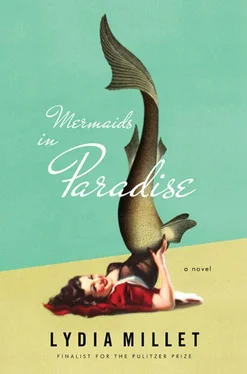“One man’s weakness is another man’s mercy,” said Ronnie.
By that time the others had joined us; every screen was tuned to the groundswell of mermaid hatred.
“What did the mermaids ever do to them ?” asked Janeane. “It’s unloving.”

WE WERE STILL huddled like that, scrolling and scrolling, peering and peering, when a knock came on the door: Simonoff, the doctor, Raleigh, and Sam.
“She wasn’t there!” said Simonoff.
You’d think he’d be distressed by this fact, his inability to locate the physical evidence of his only daughter, but his face was glowing with energy, a fine sheen of sweat. I saw a glint in his eyes.
“What do you mean?” said Chip. “It’s the only facility on the island. With, um, the necessary — cold storage.”
“Exactly,” said Simonoff. “The attendant said they never saw a body. Not only that, they never heard of a body. No one ever called to make any arrangements. No one got notified. We talked to everyone there. Literally every single person on staff.”
He took his glasses off and wiped the lenses on his tie. Scrubbed them, more like, scrubbed furiously.
We looked around at each other, mystified. There was a feeling of being dumb, a feeling of stupidity.
“But here’s the kicker,” said the doctor. “They didn’t know about any death certificate.”
“It’s a small place,” said Raleigh, nodding. He had a hearty quality to him, Raleigh, an admirable meat-and-potatoes attitude a person might find almost attractive, if they were unmarried. “Usually they know right away, pretty much, when to expect business. The news gets out. But this time, nothing leaked. None of the local doctors signed a certificate. No one in an official capacity.”
Simonoff put his glasses back on, poked them up onto the bridge of his nose with the tip of a finger. He did a quick tic of a half-smile, nervous, almost imperceptible.
I saw where he was going: our emeritus was getting his hopes up. I didn’t want it to happen; it was like a slow-motion roadkill, and I couldn’t stand to watch.
“Well,” I said, in a measured tone I meant to sound matter-of-fact, “she could still be at the resort. They may not have ever released her. Although that’d make them look pretty guilty.”
“I wouldn’t put it past them,” said Chip, shaking his head. “Keeping her.”
“Did you call?” Rick asked Simonoff. “I mean, they’d have to know where the — where she got moved to, wouldn’t they?”
“I put in the calls myself,” said Raleigh. “Just to make sure management didn’t get its hooks in the professor, I went ahead and handled the inquiries.”
“And?” asked Chip.
“And nothing,” said Raleigh. “I got passed down along the admin chain, and in the end they sent me to the cops. And the cops passed the buck back to the funeral home.”
“But I saw them!” protested Steve. “The cops were the ones who rolled out the gurney.”
“You know,” said Thompson, cleaning a folding knife with a handle made of bone, maybe antler — sort of a dirty, white-brown color, narrowly ridged like corduroy. “The place has big restaurants. Restaurants that serve hundreds of people at a time. Big restaurants have big freezers.”
Gina put her hand on Simonoff’s arm, like Thompson’s bluntness might injure him. Normally G. doesn’t give a shit about bluntness/offending, if anything she aims straight for it, but after the homophobic name-calling episode she’d appointed herself a general anti-Thompson deputy, an anti-Thompson missile defense shield with broad jurisdiction.
Thompson flicked his antler knife open and closed, open and closed. With the pinkie of the other hand he rooted around in his ear.
“Looks like we need to send a contingent over there,” said Raleigh to Sam. “Doesn’t it.”
With Gina guiding him, Simonoff turned away, followed by the doctor; they needed refreshment, maybe some rest. The doctor opened the door of the mini-fridge and bent over, rummaging.
“But like, undercover,” said Rick. “We need access to the kitchens. To the. . to all the storage facilities connected to the kitchen areas.”
“Whoa,” said a soldier standing behind me, and yelled over his shoulder. “Jerry! You hear that? They need someone with restaurant access at the Big House.” Then, turning back to us: “Jerry can get you a backstage pass for sure. His girlfriend waits tables up there.”
Raleigh signed on the girlfriend, Annette, with lightning speed. Her ringing, strident voice on the other end of the speakerphone reminded me uncannily of Chip’s mother, that same combo of raw power and fingernails on a blackboard. Jerry had to promise to pay some bills if Annette lost her job as a result of the spying — her own mother had racked up a sizable debt to a psychic hotline. He got a bit sheepish when she brought that up, with all of us listening. But Annette couldn’t have cared less about Jerry’s embarrassment: that much was abundantly clear. She was slaving to pay off her mother’s credit cards, she reminded him. “This is serious shit, Jer,” she shrilled. “Serious shit.”
We had no doubt of it.
Simonoff was restless, as the late afternoon wore on, impatient for Annette to begin her shift. He had a flicker of hope now, he wasn’t as defeated as before; he stood up slightly taller, though it kept threatening to break my heart — there’s nothing more piercing than seeing hope lighten the face of a devastated person, that futile, doomed, and lovely bird of hope with its bright wings and round, dark eyes. First rising over a warm nest, wings softly spread, sheltering tiny chicks — then struck and flattened.
But there was no denying it, he and the doctor both looked better than they had an hour or two earlier. They’d been invigorated by the missing corpse. In my view, a missing corpse isn’t something to rejoice about. The absence of a corpse, well, it doesn’t mean there’s no such thing as one.
I tried to ignore their hopefulness, the easiest way to deal with it. Meanwhile Steve, I noticed, trotted out references to Nancy’s body at regular intervals, speaking about it with an attitude of clinical firmness. Our Freudian was on the case.
All of us had turned off our phones by then, save Miyoko and Chip who were doing interviews, because we couldn’t handle the call volume. Rick and Ronnie were obsessing over the mermaid haters, who had their own social media pages now — even their own funding. Their cause had been embraced by undisclosed sponsors. These sponsors, Chip opined between phone calls, seemed to be paying for rapid dissemination of the anti-mermaid message on screens across the world. Hunt them, they said, and put them down. This is a test of faith!
That lust for blood worried me; it even seemed to worry Gina, though her ironic distance prevents her from showing too much concern, typically. As she and I stood there, shoulder to shoulder at the counter of the kitchenette, and studied the chatter on the screen, I had a feeling of compression. I felt those lines and lines of speech pressing me down and overpowering me — the weight of all the haters out there, a juggernaut of loathing. What was their problem? Our problem, as a race? (I was woozy on beer and lack of sleep.) We started out soft and warm, trusting. I’d seen babies — held a couple, even.
It seemed to me the virtual world was even worse than the real one, when it came to humanity. To look at screens like these, you’d think there was nothing left of us but a pile of pixilated ash. We were a roiling mass of opinion, most of it mean. Here we sat at civilization’s technological peak, and what we chose to do on that shining pinnacle was hate each other’s guts.
Читать дальше













